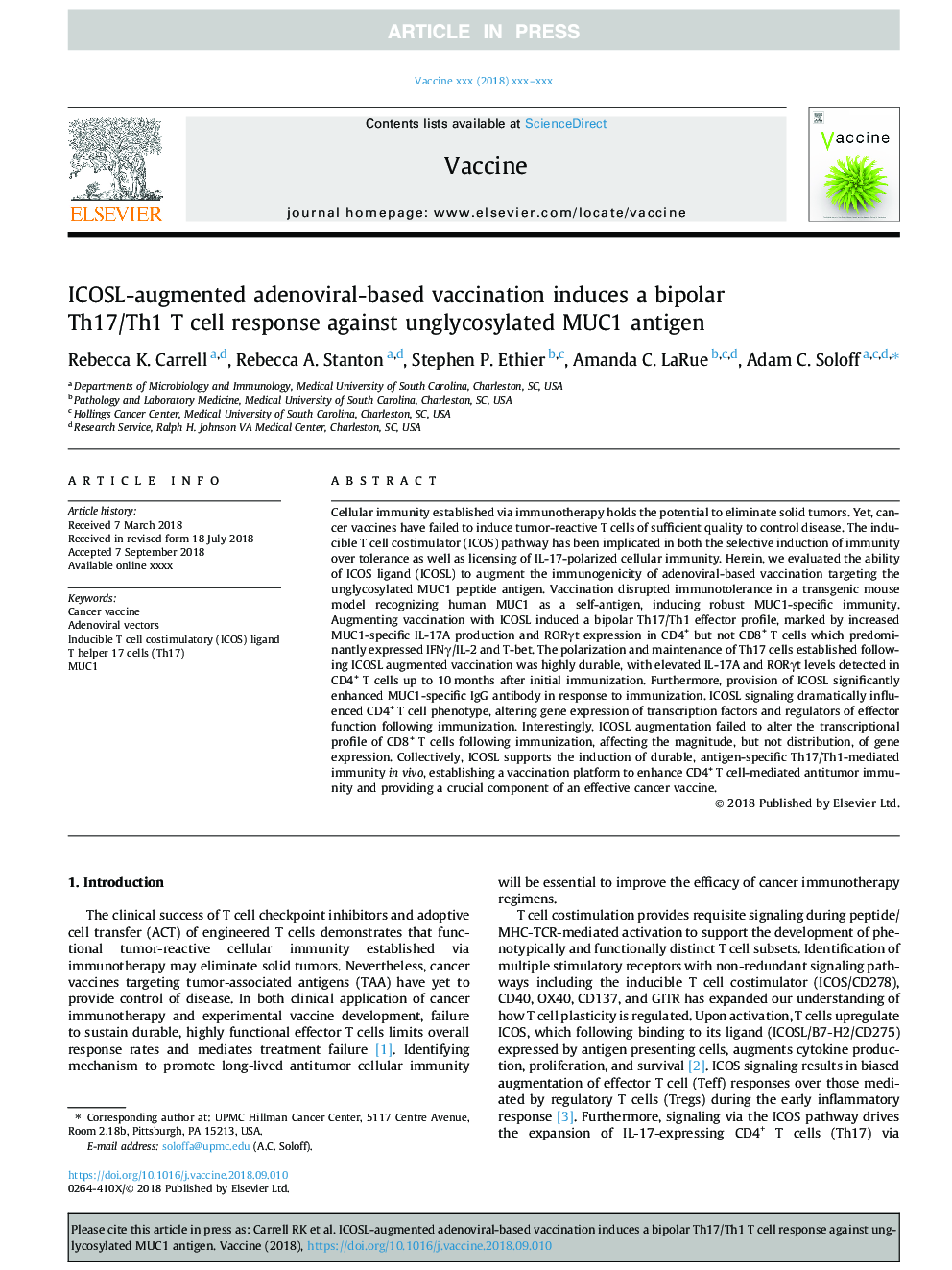| کد مقاله | کد نشریه | سال انتشار | مقاله انگلیسی | نسخه تمام متن |
|---|---|---|---|---|
| 10157959 | 1666499 | 2018 | 8 صفحه PDF | دانلود رایگان |
عنوان انگلیسی مقاله ISI
ICOSL-augmented adenoviral-based vaccination induces a bipolar Th17/Th1 T cell response against unglycosylated MUC1 antigen
دانلود مقاله + سفارش ترجمه
دانلود مقاله ISI انگلیسی
رایگان برای ایرانیان
موضوعات مرتبط
علوم زیستی و بیوفناوری
ایمنی شناسی و میکروب شناسی
ایمونولوژی
پیش نمایش صفحه اول مقاله

چکیده انگلیسی
Cellular immunity established via immunotherapy holds the potential to eliminate solid tumors. Yet, cancer vaccines have failed to induce tumor-reactive T cells of sufficient quality to control disease. The inducible T cell costimulator (ICOS) pathway has been implicated in both the selective induction of immunity over tolerance as well as licensing of IL-17-polarized cellular immunity. Herein, we evaluated the ability of ICOS ligand (ICOSL) to augment the immunogenicity of adenoviral-based vaccination targeting the unglycosylated MUC1 peptide antigen. Vaccination disrupted immunotolerance in a transgenic mouse model recognizing human MUC1 as a self-antigen, inducing robust MUC1-specific immunity. Augmenting vaccination with ICOSL induced a bipolar Th17/Th1 effector profile, marked by increased MUC1-specific IL-17A production and RORγt expression in CD4+ but not CD8+ T cells which predominantly expressed IFNγ/IL-2 and T-bet. The polarization and maintenance of Th17 cells established following ICOSL augmented vaccination was highly durable, with elevated IL-17A and RORγt levels detected in CD4+ T cells up to 10â¯months after initial immunization. Furthermore, provision of ICOSL significantly enhanced MUC1-specific IgG antibody in response to immunization. ICOSL signaling dramatically influenced CD4+ T cell phenotype, altering gene expression of transcription factors and regulators of effector function following immunization. Interestingly, ICOSL augmentation failed to alter the transcriptional profile of CD8+ T cells following immunization, affecting the magnitude, but not distribution, of gene expression. Collectively, ICOSL supports the induction of durable, antigen-specific Th17/Th1-mediated immunity in vivo, establishing a vaccination platform to enhance CD4+ T cell-mediated antitumor immunity and providing a crucial component of an effective cancer vaccine.
ناشر
Database: Elsevier - ScienceDirect (ساینس دایرکت)
Journal: Vaccine - Volume 36, Issue 42, 8 October 2018, Pages 6262-6269
Journal: Vaccine - Volume 36, Issue 42, 8 October 2018, Pages 6262-6269
نویسندگان
Rebecca K. Carrell, Rebecca A. Stanton, Stephen P. Ethier, Amanda C. LaRue, Adam C. Soloff,